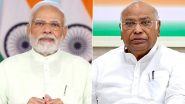Guwahati, Dec 27 (PTI) Assam Chief Minister Himanta Biswa Sarma further consolidated his position in both state and national politics by pushing the BJP's Hindutva agenda and engaging in intense anti-Congress rhetoric.
From banning the consumption of beef in public and intensifying the fight against child marriage to leading the BJP to significant electoral victories, Sarma's policies kept him in the limelight.
The Assam leg of Congress leader Rahul Gandhi's Bharat Jodo Nyay Yatra in January faced challenges due to the state government's refusal to allow him to offer prayers at the birthplace of Vaishnav saint Srimanta Sankardeva at Batadrava, and also to enter Guwahati city.
The Congress leaders and party workers tried to break through barricades and engaged in a scuffle with the police, leading to injuries to senior party leaders and workers.
The chief minister's evident animosity towards Gandhi again came to the fore when Sarma accused the Congress leader of using a 'body double' during the yatra. The CM claimed the 'body double' has been identified and the details will be revealed but failed to produce any proof thereof.
Banning of public consumption of beef in hotels, restaurants and community gatherings in the state by amending an existing law has been viewed as a step by Sarma to further BJP's Hindutva agenda, drawing flak from opposition parties as a "political gimmick" to polarise voters and also an infringement upon people's freedom.
The BJP, however, countered by stating that the decision will help to preserve cattle and create a society where the religious sentiments of all communities are respected.
The state cabinet also approved the abolition of 'The Assam Moslem Marriages and Divorces Registration Act and Rules of 1935', which permitted underage marriages under specific conditions, and the government subsequently tabled the repealing Bill in the assembly.
The chief minister asserted this was done to not only abolish child marriages but to bring registration of Muslim marriages and divorces under a proper system of the government.
The state government also continued to crack the whip on child marriage for the third time in two years with 431 people arrested and 345 cases registered in December. Authorities claimed these drives have led to a considerable decline in maternal and infant mortality rates.
The policies adopted by the state government ensured that Sarma remained in the limelight and he was rewarded with election campaign responsibilities during assembly polls in Odisha, Rajasthan, Haryana, Maharashtra, Karnataka and Jharkhand.
The chief minister also successfully led the NDA in the state to an impressive win in the Lok Sabha polls, emerging victorious in 11 of the 14 parliamentary constituencies while Congress's Gaurav Gogoi wrested the Jorhat seat from BJP and Rakibul Hussain defeated AIUDF leader Badruddin Ajmal by a record margin of over 10 lakh votes.
The BJP and its allies also emerged victorious in the by-elections to four assembly constituencies, vacated by members who were elected to the Lok Sabha, with the ruling party successfully breaching the minority stronghold Samaguri, held for over 25 years by the Congress.
The implementation of the Citizen Amendment Act (CAA) in March this year appears to have had no impact in the state with only one person, originally from Bangladesh receiving citizenship so far.
Meanwhile, the Centre unlocked the biometrics of over 9 lakh people from Assam who were affected during the National Register of Citizens (NRC) process for issuing Aadhaar cards. The state cabinet, however, decided on the linking of Aadhaar cards with NRC, stating that all applicants will get the unique identity card only if they had applied for NRC.
The signing of the tripartite peace agreement with the pro-talks faction of ULFA heralded some hope for lasting peace, although there were misgivings about its fruitfulness as no breakthrough was made regarding dialogue with ULFA(I) led by Paresh Barua.
Although insurgency-related violence dipped over the years, sporadic incidents such as ULFA(I) claiming to have planted 'bomb-like objects' during Independence Day and the arrest of militants from a few Upper Assam districts were reported.
Security concerns in Assam remained high with the arrest of suspected terrorists, including some Bangladeshis and Rohingyas, who were using the state as a corridor to either go to Delhi or Kashmir.
The situation in neighbouring Bangladesh following the deposition of former prime minister Sheikh Hasina and alleged atrocities on minorities in that country also led to concerns in Assam, which shares a 263-km-long border, with the state police beefing up security along the bordering districts.
The recent visit of Sarma to Bhutan, however, opened up new vistas for strengthening economic ties with the Himalayan country.
The state was also rocked by the online trading scam which came to the fore in August this year when investors, who had put in huge sums of money in 29-year-old Deepankar Barman's company, complained that he had not paid them the due returns and his office has been closed since August 21.
Assam's annual floods continued to wreak havoc, affecting over 50 lakh people, inundating vast tracts of land, claiming the lives of wildlife and livestock and damaging infrastructure.
(This is an unedited and auto-generated story from Syndicated News feed, LatestLY Staff may not have modified or edited the content body)













 Quickly
Quickly
















